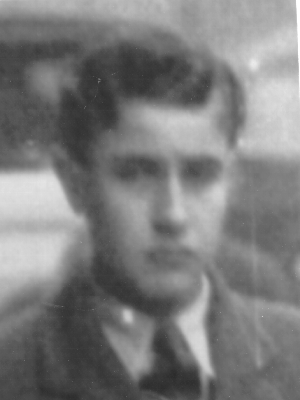
Berek, the only child of Nesza (Nugielman) and Aron Wolfowicz, grew up in a tiny town in central Poland. His family was not religious, but because most community members were, Berek received a religious education. Mr. Wolfowicz owned a tannery. Berek did not have non-Jewish friends, and did not venture into non-Jewish areas for fear of being beaten. His community was surrounded by extremely hostile Polish peasants, and antisemitism was rampant. His father's family were all in the United States, and Berek and his parents seemed always on the verge of leaving.
In September 1939, the Germans invaded Poland. A curfew was established for the Jews, and they were brutalized by German soldiers. Many were shot for violating the curfew. Between 1939 and 1942, the Germans gradually increased the persecution. Jews were not permitted to attend school. Berek had a tutor who secretly came to his home to prepare him for his Bar Mitzvah. Jewish businesses were closed or confiscated. The Jews were confined in a sealed-off ghetto, where there was little food. Individuals survived by selling their possessions. Berek's father smuggled food into the ghetto so his family could eat. There was much brutality. The Germans would beat Jews, shoot them at random, and arrest them in sudden raids.
In July 1942, when Berek was fourteen years old, he and his father were picked up in a raid. They had been hiding in a cornfield, when a Pole, who had seen them, pointed them out to the Germans. They were forced to work as slave laborers in a nearby munitions factory. They attempted an escape by bribing a camp employee, but he never showed up and they were caught. Berek's father died as a result of the horrendous conditions and inadequate food. Young Berek received extra food and was given some protection by the two German women who ran the factory. In 1944, he was moved to another labor camp. When the Russians began their advance into Poland, the Germans packed up their machinery and moved to a factory near the Buchenwald concentration camp in Germany. Somehow Berek "fell through the cracks" and managed to remain alive. The day before Buchenwald was liberated, on April 9, 1945, Berek and 5,000 other inmates were marched out of the camp and put on a "death train." The train simply went around in circles and the inmates were never given food. Only 800 were alive on May 5, 1945, when the train finally stopped in Theresienstadt , Czechoslovakia. On May 8, Theresienstadt was liberated.
Berek was physically broken. He had lost most of his teeth and was in the last stages of starvation. His parents had been murdered, and he had no home. He was seventeen years old.